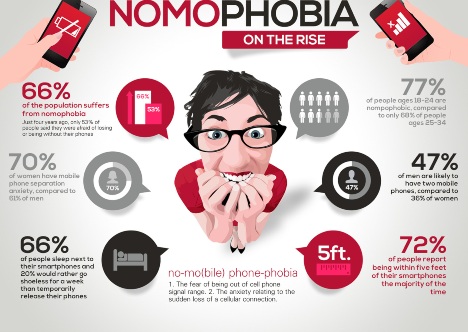What Is Nomophobia | Addicted To Mobile Phones | Phoneless Phobia Infographics: Nowadays, mobiles have become the most pervasive part of the current lifestyle of humans. Not only these mobile phones aid for communication; besides, they serve to help as a personal planner, digital shopping apps, social network apps, calendars, clock, and so on. Without any doubt, cell phones remain a valuable device; but, many psychologists propose that overusing digital appliances may cause a kind of behavioral addiction.

Recently, the term “nomophobia” is trending everywhere, which describes a state of fear that a person experiences without his/her cell phones. This encloses not just missing, forgetting, or breakage of phones, and this also includes being without in contact with the mobiles. When people miss their phone, or dried out batteries, or when in a zone without network coverage, they can experience the mood of stress and anxiety or even feel fear or panic. This feeling of fear without mobile phones is recognized as the sign of awkward use of digital devices that many psychologists believe they encounter a detrimental effect on mental health.
Overview of Nomophobia:
The scientific term nomophobia can be abbreviated as “no mobile phone phobia” and UK Postal Office coined this term in 2008. The study on nomophobia discovered that the effect of fear will be much powerful that the people affected will never intend to switch off their mobiles even during night time and also during the times when they won’t use their phones. While asking for the reasons, 55% of the affected person says that they need to keep in touch with friends and families, 10% reported they need it for contacting purpose, and 9% says that they feel anxious while they switch off their phones.
The latest findings prove that nomophobia is nowadays becoming quite common among many people. One recent study states that above 22% of contestants showed severe signs of nomophobia and about 60% of the contestants experienced some mild signs of this condition. A notable point to mention here is, nomophobia becomes the most searched keyword of the year according to the latest reports of Cambridge University.
Symptoms that Indicates Nomophobia:

A debate going on in the medical community questions whether the nomophobia is an anxiety disorder, or lifestyle disorder, or phobia, or even an addiction. Until today, nomophobia does not fall under any particular clinical diagnosis and it was just placed in DSM-5. Some of the major symptoms, which are commonly identified in the affected person are listed below:
- Their inability to switch off their mobile phone.
- Continuously checking their phones for notifications.
- Excessively charging the mobiles after they are fully charged.
- Taking their mobile anywhere they go, even into their bathroom.
- Checking repeatedly to ensure that they have their phones with them.
- Fear to stay without network coverage, Wi-Fi connection, or cellular data.
- Always worrying about the negative things and are unable to ask for any help.
- Avoiding planned activities or occasions to occupy time with their mobile phones.
Besides, the affected person also experiences emotional, psychological, and as well as physiological symptoms. The person may have a faster-breathing rate, more sweat, increased heartbeat, shakes, and tremble. Further, they also begin to feel faint or feeble. In severe cases, there may be a chance of a panic attack. Sadly, nomophobia was considered as the most trending keyword of the year in recent times.
Causes of Nomophobia:
The experts describe a wide range of causes due to which the people experience nomophobia symptoms. Notable origins of nomophobia are mentioned below.
- Using mobile phones for Daily Tasks – Helpfulness of mobile devices acts as a key role in nomophobia. Especially, the smartphones grab a wider part in this and behavioral addiction occurs. Because today’s generation uses the mobiles for all significant tasks, imaginably if people feel lonely or when cannot able to do these important aspects then they will be affected by this phobia.
- The extent of Use Every Day – In 2014, a study says that the student spends more time of nine hours per day on their mobile phone. Smartphones help students to find more information available on the internet, but with continuous usage, they pose as a major reason for stress building.
- Awareness about Technology – In this era, phone separation anxiety was very common among adults and teens. Because these young adults were born and living in the age of digital technology. They had been already in access to the internet, computer, and smartphones.
Diagnosis of Nomophobia:
Nomophobia Questionnaire (NMP-Q) was developed by scientists to evaluate the nomophobia symptoms, and further, the studies propose that these questionnaires help to measure the fear the affected person shows when he or she is without a mobile. The affected person was requested to rate how sturdily they agree or disagree with the statements given in the questionnaires. This phobia was trending especially among the learners and teens. One study has found that the NMP questionnaire can measure extreme levels of nomophobia which suggests that they can have comorbidity with other disorders. Research says that people affected with both panic disorder and anxiety can also possess a chance to develop nomophobia.
Treatment for Nomophobia:
If a person shows symptoms of nomophobia, then he can consult a psychologist. Though there is no precise treatment for nomophobia, a psychologist may prescribe the client with cognitive- behavioral therapy and exposure therapy; in some cases, medications are also prescribed.
- Exposure Therapy – This is behavioral therapy and in which the patients will increasingly learn to face the fear. In nomophobia, the patient will slowly go out without their phone.
- Cognitive-Behavioral Therapy – This process reports the irrational and negative thought outlines, which cause maladaptive behavior. The therapist helps the patient to cope up with the thought process and replace the thoughts with a more balanced and realistic one.
- Medications – Although, there is no medication approved by the FDA for nomophobia treatment, the doctor or psychiatrist can prescribe antidepressants or anti-anxiety medications for some of these symptoms. Further, selective serotonin reuptake inhibitors are normally prescribed as first-line treatments for depression and anxiety.
Everyone knows the famous moral of “Prevention is better than cure”; so, before getting affected by the nomophobia individuals should be aware of such behavioral addiction that smartphones can cause.